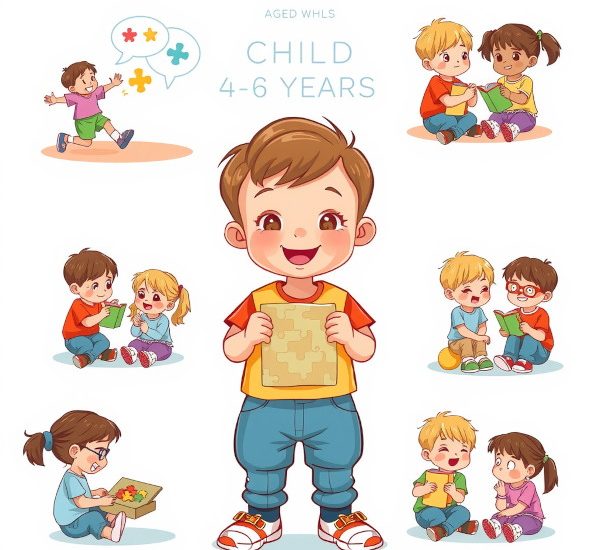Egocentrism and ego-appreciation in children: key insights for parents
Introduction
As parents, we often find ourselves navigating the complex world of child psychology. Two terms that frequently come up are ‘egocentrism’ and ‘ego-appreciation’. These might sound like jargon straight out of a psychology textbook, but understanding these concepts can provide key insights into your child’s behavior and development. This knowledge can help you guide your little ones as they grow and mature, fostering their emotional intelligence along the way.
Understanding egocentrism in children
Egocentrism is a term coined by Swiss psychologist Jean Piaget to describe a stage in a child’s development where they believe everyone sees the world as they do. For example, if you’ve ever noticed a toddler hiding by covering their eyes, it’s because they genuinely believe that if they can’t see you, you can’t see them either. This behavior is most prominent between ages 2-7.
But how does egocentrism impact children beyond these adorable moments of hide-and-seek? In essence, it shapes how children interact with others and learn from their environment. It can lead to misunderstandings or conflicts with peers, as children struggle to understand perspectives different from their own. They may have difficulty sharing or taking turns because they’re unable to fully grasp that other people have needs and desires just like them.
Understanding ego-appreciation in children
On the other hand, ego-appreciation involves recognizing one’s abilities and accomplishments. For instance, when your child proudly shows off a drawing or celebrates learning to tie their shoelaces independently for the first time – these are demonstrations of ego-appreciation.
Unlike egocentrism which centers around an inability to understand others’ perspectives, ego-appreciation isn’t about ignoring others but acknowledging one’s achievements. It plays a vital role in building self-esteem and confidence. A healthy sense of ego-appreciation can motivate children to try new things, persist in the face of challenges, and take pride in their accomplishments.
The role of parents in managing egocentrism and ego-appreciation
As parents, it’s crucial to guide our children through these stages of psychological development. We need to help them balance egocentrism with empathy for others while encouraging healthy ego appreciation without fostering arrogance or entitlement.
This is a delicate balancing act, but with patience and understanding, we can help our children navigate these developmental stages successfully. Our role isn’t to eliminate egocentrism or ego-appreciation – both are normal parts of child development – but rather to provide guidance and support as our children learn to manage these aspects of their personality.
Strategies for dealing with egocentric behavior
Here are some strategies you can use:
- Empathy training: Encourage your child to consider how others might feel in various situations. This could be as simple as asking “How do you think your friend felt when you took his toy?” or “How would you feel if someone did that to you?”
- Perspective-taking exercises: Use stories or role-play scenarios to help your child understand different viewpoints. Children’s books often present moral dilemmas that can spark discussions about empathy and understanding.
- Patience: Remember, egocentrism is a normal part of development and most children outgrow it with time. Be patient with your child as they learn to see the world from other people’s perspectives.
Encouraging healthy ego-appreciation
To foster healthy ego-appreciation:
- Praise effort, not just outcome: Compliment your child for their hard work, not just the end result. This helps them understand that effort and persistence are valuable traits.
- Encourage independence: Let your child take on age-appropriate tasks to build their confidence and self-esteem. This could be anything from dressing themselves to helping set the table for dinner.
- Model humility: Show your child that it’s okay to be proud of achievements without belittling others. Demonstrate how you can appreciate your own accomplishments while also celebrating those of others.
Case studies: real-life examples of managing egocentrism and ego-appreciation
Let’s look at some real-life examples:
- Emma, a mother of two, noticed her son struggling to share toys with his sister. She used storybooks illustrating sharing and empathy to help him understand his sister’s feelings when he didn’t share.
- John encouraged his daughter’s love for painting but noticed she was becoming boastful about her skills. He praised her effort and creativity while reminding her that everyone has unique talents.
These stories highlight how understanding egocentrism and ego-appreciation can equip parents with strategies to guide their children towards empathetic behavior and healthy self-esteem.
Conclusion
Understanding egocentrism and ego-appreciation can provide valuable insights into your child’s development. As parents, we play a crucial role in guiding our children through these stages, fostering empathy, humility, confidence, and self-esteem along the way.
Remember that every child is unique – what works for one might not work for another. So be patient, keep learning, and adapt these strategies as needed to best support your child’s growth.
We’d love to hear about your experiences or any questions you have about managing egocentrism and fostering healthy ego appreciation. Feel free to share in the comments below!
Call-to-action
Enjoyed this post? Please share it with your friends and family who might find it helpful. And don’t forget to subscribe to our blog for more parenting insights.




